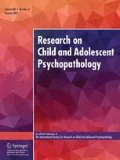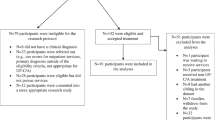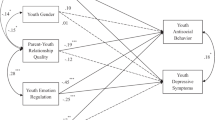Abstract
Although there is relative consensus in the literature regarding associations between certain emotion socialization (ES) strategies and youth behavioral health, there is very limited research from a person-centered perspective. To address this gap, the current study examined patterns of ES strategies in families and explored predictors and youth outcomes associated with those patterns. An economically-diverse sample of 229 predominately White mothers and fathers of youth aged 3–12 years was recruited online for a longitudinal study. Latent profile analysis was used to determine the optimal number of family clusters with similar ES profiles. Model fit supported a four-class model, which consisted of an Emotion Coaching profile, characterized by the lowest levels of putatively labeled unsupportive ES practices and the highest levels of putatively labeled supportive ES practices, a Moderate profile characterized by moderate levels of both unsupportive and supportive ES practices, a Limited Engagement profile characterized by low levels of both unsupportive and supportive ES practices, and an Emotion Dismissing profile characterized by the highest levels of unsupportive ES practices and the lowest levels of supportive ES practices. Cross-sectional and longitudinal differences were observed across the ES profiles with regard to demographic and parent emotional competence predictors and youth outcomes. The current study extends the literature on ES by providing evidence on how distinct ES profiles differentially predict youth behavioral health outcomes. Findings also underscore the importance of examining parent emotional competence as a catalyst for adaptive change in the family system.



Similar content being viewed by others
Data Availability
Anonymized data and code are available via Open Science Framework - https://osf.io/6f3c9/
References
Achenbach, T. M., McConaughy, S. H., Ivanova, M. Y., & Rescorla, L. A. (2011). Manual for the ASEBA Brief Problem Monitor™ (BPM). Burlington, VT: University of Vermont: University of Vermont Research Center for Children, Youth, and Families.https://doi.org/10.1111/j.1467-9507.2010.00585.x
Baker, J. K., Fenning, R. M., & Crnic, K. A. (2011). Emotion socialization by mothers and fathers: Coherence among behaviors and associations with parent attitudes and children’s social competence. Social Development, 20(2), 412–430. https://doi.org/10.1111/j.1467-9507.2010.00585.x
Bakk, Z., Tekle, F., & Vermunt, J. (2013). Estimating the association between latent class membership and external variables using bias-adjusted three-step approaches. Sociological Methodology, 43, 272–311. https://doi.org/10.1177/0081175012470644
Barroso, N. E., Mendez, L., Graziano, P. A., & Bagner, D. M. (2018). Parenting stress through the lens of different clinical groups: A systematic review & meta-analysis. Journal of Abnormal Child Psychology, 46(3), 449–461. https://doi.org/10.1007/s10802-017-0313-6
Bowers, E. P., Johnson, S. K., Buckingham, M. H., Gasca, S., Warren, D. J. A., Lerner, J. V., & Lerner, R. M. (2014). Important non-parental adults and positive youth development across mid- to late-adolescence: The moderating effect of parenting profiles. Journal of Youth Adolescence, 43, 897–918.
Breaux, R. P., Harvey, E. A., & Lugo-Candelas, C. I. (2016). The role of parent psychopathology in emotion socialization. Journal of Abnormal Child Psychology, 44(4), 731–743. https://doi.org/10.1007/s10802-015-0062-3
Brown, K. W., & Ryan, R. M. (2003). The benefits of being present: Mindfulness and its role in psychological well-being. Journal of Personality and Social Psychology, 84(4), 822–848. https://doi.org/10.1037/0022-3514.84.4.822
Buckholdt, K. E., Parra, G. R., & Jobe-Shields, L. (2014). Intergenerational transmission of emotion dysregulation through parental invalidation of emotions: Implications for adolescent internalizing and externalizing behaviors. Journal of Child and Family Studies, 23, 324–332.
Buhrmester, M. D., Kwang, T., & Gosling, S. D. (2011). Amazon’s Mechanical Turk: A new source of inexpensive, yet high-quality, data? Perspectives on Psychological Science, 6(1), 3–5. https://doi.org/10.1177/1745691610393980
Calkins, S. D., & Bell, K. L. (1999). Developmental transitions as windows to parental socializaiton of emotion. Psychological Inquiry, 10, 368–372.
Cassano, M., Parrish, C., & Zeman, J. (2007). Influence of gender on parental socialization of children’s sadness regulation. Social Development, 16, 210–231. https://doi.org/10.1111/j.1467-9507.2007.00381.x
Castro, V. L., Halberstadt, A. G., & Garrett-Peters, P. T. (2018). Changing tides: Mothers’ supportive emotion socialization relates negatively to third-grade children’s social adjustment in school. Social Development, 27(3), 510–525. https://doi.org/10.1111/sode.12251
Chorpita, B. F., Reise, S., Weisz, J. R., Grubbs, K., Becker, K. D., & Krull, J. L. (2010). Evaluation of the Brief Problem Checklist: Child and caregiver interviews to measure clinical progress. Journal of Consulting and Clinical Psychology, 78(4), 526–536. https://doi.org/10.1037/a0019602
Coatsworth, J. D., Duncan, L. G., Berrena, E., Bamberger, K. T., Loeschinger, D., Greenberg, M. T., & Nix, R. L. (2014). The Mindfulness-enhanced Strengthening Families Program: Integrating brief mindfulness activities and parent training within an evidence-based prevention program. New Directions for Youth Development, 142, 45–58. https://doi.org/10.1002/yd.20096
Coatsworth, J. D., Duncan, L. G., Nix, R. L., Greenberg, M. T., Gayles, J. G., Bamberger, K. T., Berrena, E., & Demi, M. A. (2015). Integrating mindfulness with parent training: Effects of the Mindfulness-Enhanced Strengthening Families Program. Developmental Psychology, 51(1), 26–35. https://doi.org/10.1037/a0038212
Cummingham, J. N., Kliewer, W., & Garner, P. W. (2009). Emotion socialization, child emotion understanding and regulation, and adjustment in urban African American families: Differential associations across child gender. Development and Psychopathology, 21, 261–283. https://doi.org/10.1017/S0954579409000157
Denham, S., & Kochanoff, A. T. (2002). Parental contributions to preschoolers’ understanding of emotion. Marriage & Family Review, 34(3–4), 311–343. https://doi.org/10.1300/J002v34n03_06
Dunbar, A. S., Leerkes, E. M., Coard, S. I., Supple, A. J., & Calkins, S. (2017). An integrative conceptual model of parental racial/ethnic and emotion socialization and links to children’s social-emotional development among African American families. Child Development Perspectives, 11, 16–22. https://doi.org/10.1111/cdep.12218
Dunbar, A. S., Zeytinoglu, S., & Leerkes, E. M. (2021). When is parental suppression of black children’s negative emotions adaptive? The role of preparation for racial bias and children’s resting cardiac vagal tone. Research on Child and Adolescent Psychopathology.
Eisenberg, N., Cumberland, A., & Spinrad, T. L. (1998). Parental socialization of emotion. Psychological Inquiry, 9(4), 241–273. https://doi.org/10.1207/s15327965pli0904_1
Eisenberg, N., Spinrad, T. L., & Eggum, N. D. (2010). Emotion-related self-regulation and its relation to children’s maladjustment. Annual Review of Clinical Psychology, 6, 495–525. https://doi.org/10.1146/annurev.clinpsy.121208.131208
England-Mason, G., & Gonzalez, A. (2020). Intervening to shape children’s emotion regulation: A review of emotion socialization parenting programs for young children. Emotion, 20, 98–104. https://doi.org/10.1037/emo0000638
Fabes, R. A., Eisenberg, N., & Bernzweig, J. (1990). The Coping with Children's Negative Emotions Scales. Arizona State University.
Fabes, R. A., Poulin, R. E., Eisenberg, N., & Madden-Derdich, D. A. (2002). The Coping with Children’s Negative Emotions Scale (CCNES): Psychometric properties and relations with children’s emotional competence. Marriage & Family Review, 34, 285–310. https://doi.org/10.1300/J002v34n03_05
Fainsilber Katz, L., Stettler, N., & Gurtovenko, K. (2016). Traumatic stress symptoms in children exposed to intimate partner violence: The role of parent emotion socialization and children’s emotion regulation abilities. Social Development, 25, 47–65. https://doi.org/10.1111/sode.12151
Faro, A., McKee, L. G., Garcia, R. L., & O’Leary, J. L. (2019). Emotion socialization, social connectedness and internalizing symptoms in emerging adults. Journal of Applied Developmental Psychology, 64, 101051. https://doi.org/10.1016/j.appdev.2019.101051
Garside, R. B., & Klimes-Dougan, B. (2002). Socialization of discrete negative emotions: Gender differences and links with psychological distress. Sex Roles: A Journal of Research, 47(3–4), 115–128. https://doi.org/10.1023/A:1021090904785
Gershoff, E. T. (2002). Corporal punishment by parents and associated child behaviors and experiences: A meta-analytic and theoretical review. Psychological Bulletin, 128, 539–579.
Gottman, J. M., Katz, L. F., & Hooven, C. (1996). Parental meta-emotion philosophy and the emotional life of families: Theoretical models and preliminary data. Journal of Family Psychology, 10, 243–268. https://doi.org/10.1037/0893-3200.10.3.243
Hauser, D. J., & Schwarz, N. (2016). Attentive Turkers: MTurk participants perform better on online attention checks than do subject pool participants. Behavior Research Methods, 48(1), 400–407. https://doi.org/10.3758/s13428-015-0578-z
Hajal, N. J., & Paley, B. (2020). Parental emotion and emotion regulation: A critical target of study for research and intervention to promote child emotion socialization. Developmental Psychology, 56(3), 403–417. https://doi.org/10.1037/dev0000864
Havighurst, S., & Kehoe, C. (2017). The role of parental emotion regulation in parent emotion socialization: Implications for intervention. In K. Deater-Deckard & R. Panneton (Eds.), Parental Stress and Early Child Development: Adaptive and Maladaptive Outcomes (p. 285–307). Springer International Publishing. https://doi.org/10.1007/978-3-319-55376-4_12
Herbert, S., Harvey, E., Roberts, J., Wichowski, K., & Lugo-Candelas, C. (2013). A randomized controlled trial of a parent training and emotion socialization program for families of hyperactive preschool-aged children. Behavior Therapy, 44, 302–316. https://doi.org/10.1016/j.beth.2012.10.004
Hernandez, E., Smith, C. L., Day, K. L., Neal, A., & Dunsmore, J. C. (2018). Patterns of parental emotion-related discourse and links with children’s problem behaviors: A person-centered approach. Developmental Psychology, 54(11), 2077–2089. https://doi.org/10.1037/dev0000602
Hurrell, K. E., Houwing, F. L., & Hudson, J. L. (2017). Parental meta-emotion philosophy and emotion coaching in families of children and adolescents with an anxiety disorder. Journal of Abnormal Child Psychology, 45(3), 569–582. https://doi.org/10.1007/s10802-016-0180-6
Jones, S., Eisenberg, N., Fabes, R. A., & MacKinnon, D. P. (2002). Parents' reactions to elementary school children's negative emotions: Relations to social and emotional functioning at school. Merrill-Palmer Quarterly (1982-), 133–159.
Katz, L. F., Maliken, A. C., & Stettler, N. M. (2012). Parental meta-emotion philosophy: A review of research and theoretical framework. Child Development Perspectives, 6, 417–422. https://doi.org/10.1111/j.1750-8606.2012.00244.x
Klimes-Dougan, B., & Zeman, J. (2007). Introduction to the special issue of Social Development: Emotion socialization in childhood and adolescence [Editorial]. Social Development, 16(2), 203–209. https://doi.org/10.1111/j.1467-9507.2007.00380.x
Labella, M. H. (2018). The sociocultural context of emotion socialization in African American families. Clinical Psychology Review, 59, 1–15. https://doi.org/10.1016/j.cpr.2017.10.006
Leerkes, E., Supple, A. J., & Gudmunson, J. A. (2014). Ethnic differences in women’s emotion reactions to parental nonsupportive emotion socialization. Marriage & Family Review, 50, 435–446.
Lo, Y., Mendell, N. R., & Rubin, D. B. (2001). Testing the number of components in a normal mixture. Biometrika, 88(3), 767–778. https://doi.org/10.1093/biomet/88.3.767
Luby, J. L., Barch, D. M., Whalen, D., Tillman, R., & Freedland, K. E. (2018). A randomized controlled trial of parent-child psychotherapy targeting emotion development for early childhood depression. The American Journal of Psychiatry, 175(11), 1102–1110. https://doi.org/10.1176/appi.ajp.2018.18030321
Lugo-Candelas, C. I., Harvey, E. A., & Breaux, R. P. (2015). Emotion socialization practices in Latina and European-American mothers of preschoolers with behavior problems. Journal of Family Studies, 21, 144–162. https://doi.org/10.1080/13229400.2015.1020982
Lunkenheimer, E. S., Shields, A. M., & Cortina, K. S. (2007). Parental emotion coaching and dismissing in family interaction. Social Development, 16(2), 232–248. https://doi.org/10.1111/j.1467-9507.2007.00382.x
Luthar, S. S. (2003). The culture of affluence: Psychological costs of material wealth. Child Development, 74, 1581–1593.
Luthar, S. S., & Latendresse, S. J. (2005). Children of the affluent: Challenges to well-being. Current Directions in Psychological Science, 14(1), 49–53. https://doi.org/10.1111/j.0963-7214.2005.00333.x
Maliken, A. C., & Katz, L. F. (2013). Exploring the impact of parental psychopathology and emotion regulation on evidence-based parenting interventions: A transdiagnostic approach to improving treatment effectiveness. Clinical Child Family Psychological Review, 16, 173–186.
McElwain, N. L., Halberstadt, A. G., & Volling, B. L. (2007). Mother- and father-reported reactions to children’s negative emotions: relations to young children’s emotional understanding and friendship quality. Child Development, 78(5), 1407–1425. https://doi.org/10.1111/j.1467-8624.2007.01074.x
McKee, L. G., Faro, A. L., O’Leary, J. L., Spratt, K., & Jones, D. J. (2015). Socializing positive emotion: A qualitative study of African American single mothers and their adolescent youth. Family Relations, 64, 635–650. https://doi.org/10.1111/fare.12160
McKee, L. G., Jones, D. J., Vaughn, A., & Ward, D. (2015). Parental depressive symptoms and emotion regulation: Impact on emotion socialization. In L. G. McKee (Chair), Next steps in emotion socialization research: Exploring the context of parental stress and psychopathology. Symposium presented at the Society for Research in Child Development 2015 Biennial Meeting, Philadelphia, PA.
McKee, L. G., Parent, J., Zachary, C. R., & Forehand, R. (2018). Mindful parenting and emotion socialization practices: Concurrent and longitudinal associations. Family Process, 57(3), 752–766. https://doi.org/10.1111/famp.12329
Miller, R. L., Dunsmore, J. C., & Smith, C. L. (2015). Effortful control and parents’ emotion socialization patterns predict children’s positive social behavior: A person-centered approach. Early Education and Development, 26(2), 167–188. https://doi.org/10.1080/10409289.2015.975034
Miller-Slough, R., & Dunsmore, J. (2016). Parent and friend emotion socialization in adolescence: Associations with psychological adjustment. Adolescent Research Review, 1, 1–19. https://doi.org/10.1007/s40894-016-0026-z
Miller-Slough, R. L., Dunsmore, J. C., Zeman, J. L., Sanders, W. M., & Poon, J. A. (2017). Maternal and paternal reactions to child sadness predict children’s psychosocial outcomes: A family-centered approach. Social Development, 27, 495–509. https://doi.org/10.1111/sode.12244
Mirabile, S. P., Oertwig, D., & Halberstadt, A. G. (2018). Parent emotion socialization and children’s socioemotional adjustment: When is supportiveness no longer supportive? Social Development, 27, 466–481.
Morelen, D., Shaffer, A., & Suveg, C. (2016) Maternal emotion regulation: Links to emotion parenting and child emotion regulation. Journal of Family Issues, 37, 1891–1916.
Morris, A. S., Criss, M. M., Silk, J. S., & Houltberg, B. J. (2017). The impact of parenting on emotion regulation during childhood and adolescence. Child Development Perspectives, 4, 233–238.
Morris, A. S., Silk, J. S., Steinberg, L., Myers, S. S., & Robinson, L. R. (2007). The role of the family context in the development of emotion regulation. Social Development, 16(2), 361–388. https://doi.org/10.1111/j.1467-9507.2007.00389.x
Muthén, L. K., & Muthén, B. O. (2017). Mplus:Statistical Analysis with Latent Variables: User’s guide (Version 8). Los Angeles, CA: Authors.
Mumford, E. A., Lui, W., & Taylor, B. G. (2016). Parenting profiles and adolescent dating relationship abuse: Attitudes and experiences. Journal of Youth and Adolescence, 45, 959–972.
Nelson, E. E., Leibenluft, E., McClure, E., & Pine, D. S. (2005). The social re-orientation of adolescence: A neuroscience perspective on the process and its relation to psychopathology. Psychological Medicine, 35, 163–174. https://doi.org/10.1017/s0033291704003915
Nelson, J. A., Leerkes, E. M., O’Brien, M., Calkins, S. D., & Marcovitch, S. (2012). African American and European American mothers’ beliefs about negative emotions and emotion socialization practices. Parenting: Science and Practice, 12, 22–41. https://doi.org/10.1080/15295192.2012.638871
Nelson, J. A., Leerkes, E. M., Perry, N. B., O’Brien, M., Calkins, S. D., & Marcovitch, S. (2013). European-American and African-American mothers’ emotion socialization practices relate differently to their children’s academic and social-emotional competence. Social Development, 22, 485–498. https://doi.org/10.1111/j.1467-9507.2012.00673.x
Oddo, L. E., Miller, N. V., Felton, J. W., Cassidy, J., Lejuez, C. W., & Chronic-Tuscano, A. (2020). Maternal emotion dysregulation predicts emotion socialization practices and adolescent emotion lability: Conditional effects of youth ADHD symptoms. Journal of Abnormal Child Psychology. https://doi.org/10.1007/s10802-020-00686-9
O’Leary, J. L. (2020). The role of emotion socialization and emotion regulation in protecting community violence-exposed urban youth. [Doctoral dissertation, Clark University]. Available from ProQuest Dissertations and Theses database.
O’Leary, J. L., McKee, L. G., & Faro, A. L. (2019). Guilt and shame: Explaining associations between emotion socialization and emerging adult well-being. Family Relations, 68, 608–623. https://doi.org/10.1111/fare.12394
O’Neal, C. R., & Magai, C. (2005). Do parents respond in different ways when children feel different emotions? The emotional context of parenting. Development and Psychopathology, 17(2), 467–487. https://doi.org/10.1017/S0954579405050224
Parent, J., & Forehand, R. (2017). The Multidimensional Assessment of Parenting Scale (MAPS): Development and psychometric properties. Journal of Child and Family Studies, 26(8), 2136–2151. https://doi.org/10.1007/s10826-017-0741-5
Parent, J., Forehand, R., Pomerantz, H., Peisch, V., & Seehuus, M. (2017). Father participation in child psychopathology research. Journal of Abnormal Child Psychology, 45(7), 1259–1270. https://doi.org/10.1007/s10802-016-0254-5
Peer, E., Vosgerau, J., & Acquisti, A. (2014). Reputation as a sufficient condition for data quality on Amazon Mechanical Turk. Behavior Research Methods, 46(4), 1023–1031. https://doi.org/10.3758/s13428-013-0434-y
Perry, N., Dollar, J. M., Calkins, S. D., Keane, S. P., & Shanahan, L. (2020). Maternal socialization of child emotion and adolescent adjustment: Indirect effects through emotion regulation. Developmental Psychology, 56, 541–552.
Saritas, D., Grusec, J. E., & Gencoz, T. (2013). Warm and harsh parenting as mediators of the relation between maternal and adolescent emotion regulation. Journal of Adolescence, 36, 1093–1101.
Shaffer, A., Suveg, C., Thomassin, K., & Bradbury, L. L. (2012). Emotion socialization in the context of family risks: Links to child emotion regulation. Journal of Child and Family Studies, 21(6), 917–924. https://doi.org/10.1007/s10826-011-9551-3
Shewark, E. A., & Blandon, A. Y. (2015). Mothers’ and fathers’ emotion socialization and children’s emotion regulation: A within-family model. Social Development, 24(2), 266–284. https://doi.org/10.1111/sode.12095
Shields, A., & Cicchetti, D. (1997). Emotion regulation among school-age children: The development and validation of a new criterion Q-sort scale. Developmental Psychology, 33(6), 906–916. https://doi.org/10.1037/0012-1649.33.6.906
Shields, A., Dickstein, S., Seifer, R., Giusti, L., Dodge Magee, K., & Spritz, B. (2001). Emotional competence and early school adjustment: A study of preschoolers at risk. Early Education and Development, 12(1), 73–96.
Sosa-Hernandez, L., Sack, L., Seddon, J. A., Bailey, K., & Thomassin, K. (2020). Mother and father repertoires of emotion socialization practices in middle childhood. Journal of Applied Developmental Psychology, 69, 101159. https://doi.org/10.1016/j.appdev.2020.101159
Spinrad, T. L., Morris, A. S., & Luthar, S. S. (2020). Introduction to the special issue: Socialization of emotion and self-regulation: Understanding processes and application. Developmental Psychology, 56, 385–389.
Thompson, S. F., Zalewski, M., Kiff, C., Moran, L., Cortes, R., & Lengua, L. J. (2020). An empirical test of the model of socialization of emotion: Maternal and child contributors to preschoolers; emotion knowledge and adjustment. Developmental Psychology, 56, 418–430.
Vermunt, J. K. (2010). Latent class modeling with covariates: Two improved three-step approaches. Political Analysis, 18, 450–469. https://doi.org/10.1093/pan/mpq025
Victor, S. E., & Klonsky, E. D. (2016). Validation of a Brief Version of the Difficulties in Emotion Regulation Scale (DERS-18) in five samples. Journal of Psychopathology and Behavioral Assessment, 38, 582–589. https://doi.org/10.1007/s10862-016-9547-9
Wang, M., Liang, Y., Zhou, N., & Zou, H. (2019). Chinese fathers’ emotion socialization profiles and adolescents’ emotion regulation. Personality and Individual Differences, 137, 33–38. https://doi.org/10.1016/j.paid.2018.08.006
Zeman, J., Dallaire, D., & Borowski, S. (2016). Socialization in the context of risk and psychopathology: Maternal emotion socialization in children of incarcerated mothers. Social Development, 25(1), 66–81. https://doi.org/10.1111/sode.12117
Zheng, Y., Pasalich, D. S., Oberth, C., McMahon, R. J., & Pinderhughes, E. E. (2017). Capturing parenting as a multidimensional and dynamic construct with a person-oriented approach. Prevention Science, 18, 281–291.
Funding
This research was supported by the Child and Adolescent Psychology Training and Research, Inc (CAPTR) and by NICHD F31HD082858 and F31HD101257.
Author information
Authors and Affiliations
Corresponding author
Ethics declarations
Ethical Approval
The University of Vermont IRB provided ethical approval.
Informed Consent
Informed consent was obtained by participants online.
Conflicts of Interest
The authors declare that they have no conflicts of interest.
Additional information
Publisher's Note
Springer Nature remains neutral with regard to jurisdictional claims in published maps and institutional affiliations.
Supplementary Information
Below is the link to the electronic supplementary material.
Rights and permissions
About this article
Cite this article
McKee, L.G., DiMarzio, K., Parent, J. et al. Profiles of Emotion Socialization Across Development and Longitudinal Associations with Youth Psychopathology. Res Child Adolesc Psychopathol 50, 193–210 (2022). https://doi.org/10.1007/s10802-021-00829-6
Accepted:
Published:
Issue Date:
DOI: https://doi.org/10.1007/s10802-021-00829-6




